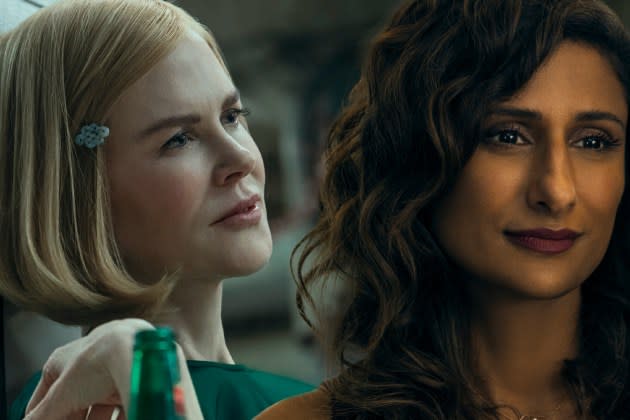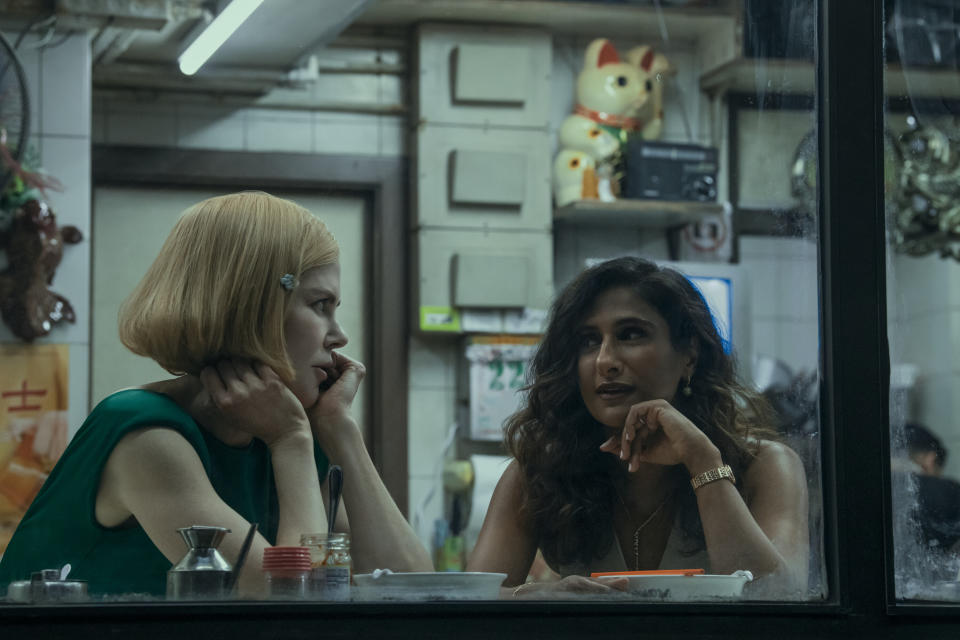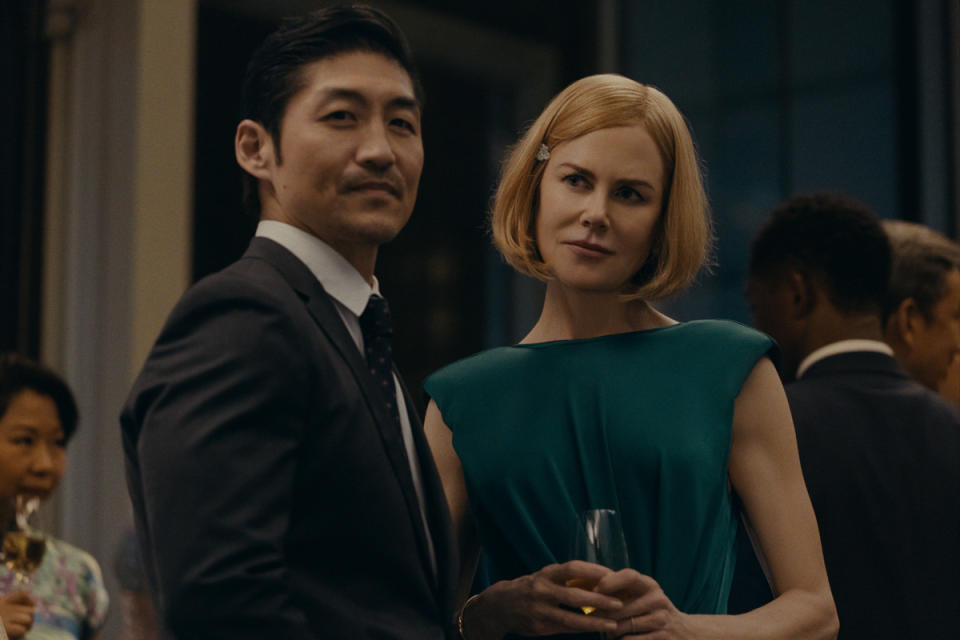Nicole Kidman & Sarayu Blue Talk ‘Expats’ Finale, The Importance Of Friendships & Forgiveness—DEADLINE Q&A
- Oops!Something went wrong.Please try again later.
- Oops!Something went wrong.Please try again later.
- Oops!Something went wrong.Please try again later.

SPOILER ALERT: The following reveals major plot points from the Prime Video limited series Expats including the finale.
Lulu Wang’s Expats, an adaptation of Janice Y. K. Lee’s novel The Expatriates, concluded its 6-episode run on Friday with the episode aptly titled “Home.” What is home exactly?
More from Deadline
Benito Skinner's 'Overcompensating' Lands Series Order At Prime Video
'Grey's Anatomy' Alum Jesse Williams To Lead & Produce Italian Series 'Costiera' For Prime Video
The limited series takes viewers on a journey with three central female characters—Margaret Woo (Nicole Kidman), Hilary Starr (Sarayu Blue) and Mercy Cho (Ji-young Yoo)—whose lives become intertwined while they’re expatriates living in Hong Kong.
On the surface, life appears blessed and busy for Americans Margaret and Hilary, two married professionals who require the assistance of one or more helpers to keep their lives running and looking perfect from the outside.
Margaret is married to Clarke (Brian Tee) who is trying to make his way up the corporate ladder while helping to raise their three children: Daisy (Tiana Gowen), Philip (Bodhi del Rosario) and Gus (Connor James). Jack Huston brings to life David, Hilary’s husband who is desperate to be a father though his wife is undecided.
Mercy, a younger and less financially stable Korean woman, enters Margaret’s life and upends it while out on a shopping trip together. Margaret is considering hiring Mercy to help with her kids so she gives her a trial run. While Daisy stays with Margaret to look at a fun stall, Mercy takes the younger boys Philip and Gus who want to keep walking. Gus, the baby of the family, disappears in a split second, as Mercy, practically a stranger, is distracted while texting. He’s gone into the night.
Hilary and David join their friends in searching for Gus when the latter bumps into Mercy and they start a conversation. Later, Hilary suspects her husband might’ve been involved with the kidnapping seeing as he was desperate to have a child. The events of that day changed everyone’s lives forever.
Throughout the season, the characters deal with trauma—both past and present—while also hoping Gus will be found. Unfortunately, that never happens and the viewer is left to imagine the myriad of situations he could have found himself him, none are pleasant. Mercy has an affair with David and soon becomes pregnant.
By the sixth episode, the three women are ready to untangle their destinies and grow from their individual and shared experiences. There’s a lot to unpack across the episodes but it ends with a beautiful message about the importance of making mistakes, learning from them and extending forgiveness and grace in the darkest of times as much to yourself as to others.
Kidman, Blue and Yoo excel at breaking your heart into a thousand pieces in Expats, then making it whole again while thoughtfully bringing to life words on a script that breaks their characters down bare. If being strong means building walls around us to avoid hurt, you will also find yourself alone in moments of joy and happiness. No, being strong is taking the good and the bad, reflecting, growing and helping others so they too may find community, as Margaret, Hilary and Mercy show in the finale.
Kidman and Blue spoke to Deadline on Thursday about the series, the importance of friendship and forgiveness, as well as what happened to Gus.

DEADLINE: These six episodes sent me on a roller coaster ride of emotions. Was the journey similar for you as you got to know your characters?
NICOLE KIDMAN: Yeah, frustrated sometimes because you go, “Oh my gosh, Margaret,” but completely in the skin of my character and in the hands of Lulu, is how I put it. Where you go, “Okay, here I am.” She hand-picked all of us. I was like, “What role should I play?” She’s like, “You’re playing Margaret.” So I’m like, “Okay. Yes, ma’am.” I think the flaws of these women and the privilege of these women and how Lulu has handled all that is extraordinary. She’s managed to pull no punches, but she’s done it with such sensitivity and such a unique, authentic sort of vision and she’s done it with her rhythm. It’s an exquisite piece of filmmaking.
SARAYU BLUE: I second so much of that. I think, certainly there were moments like in episode five there’s this moment with Hilary that you’re just like, “Wow, that is a devastating turn. It’s ugly.”
KIDMAN: But you do it brilliantly because it’s so unapologetic.
BLUE: Well, that’s it, right? That’s what you need to tell the story fully. And that is what I love about what Lulu did with this vision. She wants us all to walk away and have a conversation. You may like a character and think you’re on board and rooting for them, and then there’s a moment when your stomach drops. That reality is the most human part of all of them. I think that was such an important piece of these characters for us all to commit to wholly so that we could tell the true story of this show.
DEADLINE: And the payoff arrives in the final episode. The viewer and the characters realize we’re all just human beings sharing this experience called life and we’re all doing the best we can. At the end of the day, what matters most is family, friendship and forgiveness. What will you both take from working on Expats?
KIDMAN: Yes! What you just said. We’re all connected. Yes, we’re all from different places. We’re all from different socioeconomic backgrounds. We’re all from different cultural backgrounds, but there are our hearts and our life experiences and how we grieve, whether we want to compare them or try to challenge them or say mine is worse than yours or yours is worse than mine. There’s still an element of how we’re all walking through this and the more we’re linked, the more we help and reach out to each other. I think there’s forgiveness in that final episode, as well. Enormous forgiveness and enormous insight. Lulu is unique in the way in which she views things and she’s unique in her rhythms in the way in which she directs as well. It’s sort of almost hypnotic and she’s very uncompromising with the way she wants a frame to be and her cinematographer Anna [Franquesa-Solano] is a genius. This was a writers’ room full of powerful women. It is a very strong female-led production. To me, it is very cinematic. It didn’t play into any of the tropes of TV, and that’s very bold in this day and age. It takes guts to depict these people this way. So there’s a lot of teeth to this series.
BLUE: What a great way to word it; there’s a lot of teeth to this series. What I love that you said Rosy is that we’re all just trying to do our best. We’re humans and at our most human selves. And that’s what hopefully connects to, just the depths of the mess it is to be a human being in the world. And that’s the story, right? How messy it is to be a human being and what it requires and what it asks of us to just show up all the time. You have these stories with Margaret, Hilary and Mercy but you see the human-ness in everybody. You see it in Pastor Alan [Blessing Mokgohloa] and Clarke with Brian Tee’s exquisite performance.
KIDMAN: Ohhhh. [Brian] is so good in this.
BLUE: There’s Ruby Ruiz. I could do this all day about everyone on the show. There’s Amelyn [Pardenilla] who is doing such human work. That’s what I think moves me most about our show and why some moments are painful and other moments are funny. I’ve always felt it’s really hilarious having to be a person.
KIDMAN: Hilary can be so selfish, as can many humans in this world. But they’re trying to work things out. There’s a harshness to Margaret, there’s a harshness to Hilary at times.
BLUE: There’s some obliviousness to Mercy there, as well.
KIDMAN: Exactly! They’re like, “Well, hold on,” but then you can always understand them. The thing I like about me and Brian is our marriage. The marriage is a good marriage. Yes, it’s flawed. Yes, they are going through the most horrendous, devastating time and so therefore, you’re not seeing their best sides at all. But they’re together and they’re going to stay together. I know that they will stay together. And Brian and I would always say to each other, “This couple will actually make it because this couple is authentically true to each other.” He doesn’t say, “I’m leaving you and I’m going back.” He’s like, “We’ll be waiting. This is going to be okay.” He supports her decision to stay because he wants her to find him too. I believe there’s not a chance as a mother that I would leave. I would do exactly what Margaret did.

DEADLINE: Neither the book nor the series are clear as to what happened to poor Gus. We can certainly imagine but it’s such a sad story that you sort of hope for a happier ending.
KIDMAN: You can read articles about children that go missing that are found years later. That’s why I think it’s a hard ending for people because we’re so used to being given an ending but that’s not life. Life doesn’t end like that and certainly not with these experiences. And yes, we want to hope and we want closure because that’s the nature of our human existence. We’ll demand endings as human beings. [Laughs] But that’s not life on life’s terms. So this series is life on life’s terms.
DEADLINE: The show also ends differently from the novel without Mercy’s baby being born. Any idea why?
KIDMAN: Lulu knows everything! Aww, you wanted to see the baby, did you? You can see that ending in your head if you play it out. You can fulfill the journey for these people. One of the most devastating moments is when [Mercy] offers the baby to me. I sobbed when I read that. And of course, Margaret says, “No, I would never take your baby.” But my God, woman to woman to say that. I start crying now just thinking about that. That was one of the most powerful moments in the series. It’s just devastating. I love that sequence of us looking at the camera talking, it’s ingenious and that’s all Lulu.
DEADLINE: Sarayu, your portrayal of Hilary with all the complexities of identity and as an immigrant feeling you have one foot here and the other there— not just regarding location but also old versus new traditions— captured the nuance of these experiences to a tee. What did that mean to you?
BLUE: It means so much to me to hear you say that and to see that it resonated because I found it so moving. My mom sends a full thesis statement about every episode. She watches it then she’ll be like, “Here are my thoughts…” because she’s a writer and she’s got a very scholarly approach to life. One of the things she talked about was remembering me in India when we had gone together when I was in my early 20s. So just a couple of years ago… [laughs], She said, “I thought about your experience there and how Indians in India knew you weren’t Indian, Indian. You were Indian American. They can see that without talking to me, like with the different clothing but also just our how we move in the world.
I think it’s just such an important piece to the story. The way Sudha Bhuchar plays Brinder so authentically fed me so deeply and even Kavi Raz as the father, Daleep. That’s such a painful and powerful storyline. They brought such authenticity so it felt so real. Again, this is a testament to Lulu and the way she tells a story. From using Punjabi in the elevator, or like Rasha [Goel], who played the other woman, Geeta, told me how Lulu made a point to have the crew take their shoes off during the ceremony. That’s really important.
This interview was edited and condensed for length and clarity.
.
Best of Deadline
Hollywood & Media Deaths In 2024: Photo Gallery & Obituaries
2024 Premiere Dates For New & Returning Series On Broadcast, Cable & Streaming
2024 Awards Season Calendar - Dates For Oscars, Guilds, Tonys & More
Sign up for Deadline's Newsletter. For the latest news, follow us on Facebook, Twitter, and Instagram.

